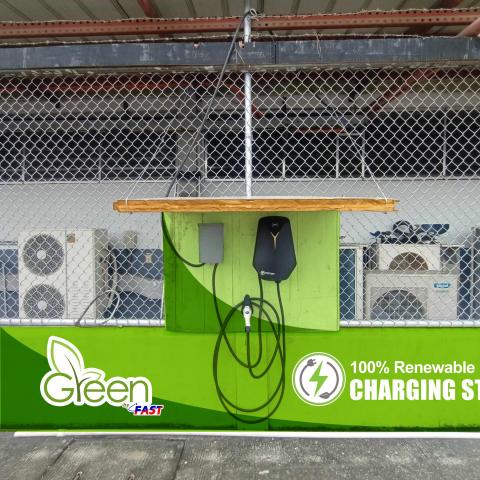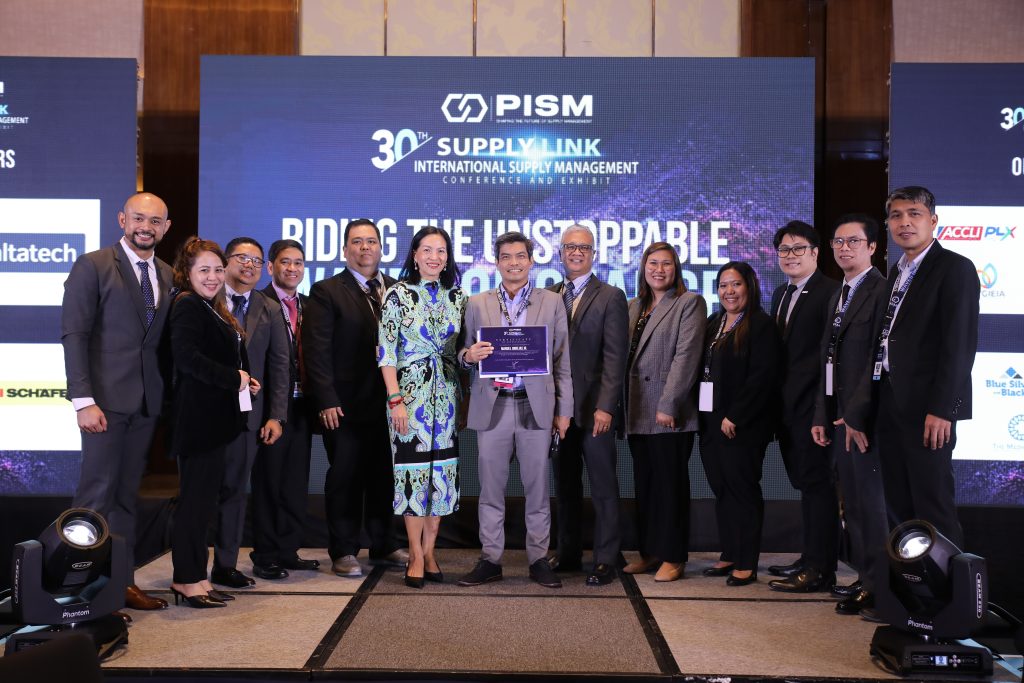
FAST Logistics Group, the leading end-to-end logistics company in the Philippines, highlights trends and best practices for integrating ESG into supply chain management.
Sustainability and ethical practices have transcended from mere buzzwords to core business imperatives. For company leaders and supply chain managers, integrating Environmental, Social, and Governance (ESG) principles into supply chain management is no longer optional but essential for business success.
Adopting ESG supply chain management practices leads to innovative solutions that drive efficiency and create value. It also organizations meet the changing demands of consumers. Ultimately, embracing ESG in supply chain management ensures businesses remain competitive while fostering long-term growth and resilience in the market.
What is ESG in Supply Chain Management
ESG or Environmental, Social, and Governance refers to a trio of factors that measure an organization’s impact on society and the environment. ESG considerations are critical for building supply chain resilience and responsible, forward-thinking enterprises. Investors now widely use these standards or criteria to assess the long-term risks and opportunities associated with businesses.
Business operations are being evaluated based on environmental performance such as reducing carbon emissions, carbon footprint, waste reduction efforts, and responsible sourcing initiatives; social responsibility such as fair labor practices and community engagement; and governance practices encompassing corporate policies, ethical conduct, and regulatory compliance.
Incorporating ESG into supply chain networks enables businesses to build resilience against risks and capitalize on opportunities for sustainable growth. With ESG, companies implement strategies to attain operational efficiency and long-term financial savings while meeting consumer demands and avoiding reputational risks.

FAST Logistics Group earned the top prize at the 2024 SCMAP Supply Chain Philippines Excellence Awards for its sustainability initiatives and innovations in logistics.
Why ESG Matters in Supply Chain Management
Over the years, the Philippines has been confronting intense weather patterns and environmental disasters. As such, there is a growing interest in ESG strategies involving supply chain networks to promote responsible practices that protect the environment and support communities in the face of climate change threats. This has led to a heightened awareness of ESG initiatives and sustainable supply chain practices.
It’s easy to perceive ESG strategies as merely a regulatory obligation or a business ploy aimed at attracting investors and consumers. But the truth is, there are various benefits of embedding ESG into your supply chain strategy. Here are some of them.
Operational Efficiency
Supply chains are the lifelines of businesses. When organizations pursue ESG initiatives, it enables them to assess and refine their processes, systems, and operations. They often make improvements to reduce their resource and energy consumption further, remove bottlenecks or unnecessary touchpoints, speed up delays, and increase productivity. Organizations that prioritize ESG goals are inherently committed to innovation, efficiency, and continuous improvements at every step of their supply chain network, from sourcing raw materials to delivering finished products.
Long-Term Savings
Adopting ESG practices in supply chains can lead to significant long-term savings. Sustainable sourcing, energy efficiency, and waste reduction initiatives reduce costs and improve resource utilization. These savings contribute to the overall financial health of the organization. Organizations that prioritize ESG efforts in supply chains are likely to yield substantial returns in the long run.
Investor and Customer Satisfaction
Ethical and sustainable practices resonate with today’s consumers. Adopting ESG principles enhances customer satisfaction and loyalty as consumers increasingly prefer brands that demonstrate a commitment to sustainability and social responsibility. Businesses can gain a competitive advantage in the market by ensuring robust corporate governance and ESG compliance throughout their supply chain and manufacturing processes.
Employee Productivity and Engagement
Companies that prioritize social responsibility tend to foster a more engaged and motivated workforce. Commitment to ethical practices and social initiatives creates a sense of pride and purpose among employees. When employees feel valued and connected with the company’s mission and objectives, they tend to experience greater job satisfaction and morale, leading to enhanced productivity and decreased turnover rates.
Risk Reduction and Resiliency
Implementing ESG principles enhances risk management and resiliency in supply chains. By improving their ESG performance, companies can mitigate potential disruptions, ensure compliance, and build a more resilient supply chain. Embracing ethical business practices not only fosters trust among stakeholders but also provides a competitive advantage in the marketplace.
Brand Reputation
A strong ESG and sustainability performance boosts a company’s brand reputation. Positive ESG practices attract investors, customers, and employees, enhancing the company’s image and credibility in the market. Poor environmental practices, unfair labor conditions, and lack of transparency can tarnish a company’s reputation and lead to financial losses.
Government Compliance
Adhering to ESG goals and principles ensures compliance with regulations and standards. This proactive approach reduces the risk of fines, penalties, and reputational damage, while also positioning the company as a leader in sustainability.

What Are the Trends in ESG for Supply Chains
Understanding the latest ESG trends is crucial for organizations aiming to enhance their supply chain strategies and ensure long-term environmental sustainability. Here are some of them.
Carbon Footprint Reduction
Reducing greenhouse gas emissions is a top priority for many organizations here and abroad. Companies are increasingly investing in renewable energy projects to harness wind, solar, and hydro power to reduce their carbon footprint.
Aside from leveraging renewable energy sources, businesses are also optimizing their logistics operations to reduce fuel consumption by adopting electric vehicles and streamlining processes. These efforts not only contribute to a healthier planet but also enhance operational efficiency and reduce costs.
Waste Reduction
Circular economy principles have also become increasingly popular in supply chains. This aims to minimize waste by reusing, recycling, and refurbishing materials. Companies are adopting circular economy principles to create closed-loop systems where products and materials are continuously repurposed, reducing waste and conserving resources.
Implementing robust recycling programs, designing products for longevity, and using recyclable packaging are effective ways to reduce waste. Companies should also encourage suppliers to adopt similar practices, ensuring a cohesive approach to waste management throughout the supply chain.
Sustainable Sourcing and Procurement
Another trend in ESG is sustainable sourcing or the process of procuring materials that are produced ethically and sustainably. This trend is gaining traction as consumers and stakeholders demand transparency and responsibility. Hence, companies are prioritizing their sustainability research and building good relationships with supply chain partners that adhere to ESG principles.
Businesses can source sustainable materials by conducting thorough audits of their suppliers and establishing long-term partnerships with like-minded companies committed to sustainability initiatives. In doing so, they ensure that their supply chains are environmentally sustainable and that their products are sourced ethically.
Improvement in Labor Practices
Ensuring fair labor practices is essential for all sustainability companies to maintain a responsible supply chain. This includes providing safe working conditions, fair wages, and respecting workers’ rights. Companies should also promote equal opportunities among employees regardless of their background.
A commitment to inclusivity helps create a diverse workforce that can drive innovation and creativity, leading to better business outcomes. By fostering a culture of respect and equality, businesses contribute to a more inclusive, equitable, and sustainable supply chain.

Community Engagement
Companies that prioritize building strong relationships with the communities they serve not only enhance their corporate reputation but also contribute to sustainable development. By actively participating in community projects, addressing local needs, and fostering inclusivity, businesses can create a positive societal impact while aligning their operations with ESG principles.
This commitment reflects a broader understanding that businesses thrive when the communities around them flourish. Stronger community engagement also positions companies to better understand their customers, innovate effectively, and ultimately drive long-term success in their respective markets.
Formation of ESG Teams
Establishing dedicated ESG teams within organizations is vital for driving sustainability initiatives. These teams are responsible for developing and implementing sustainability strategies, conducting audits, engaging stakeholders, and reporting on ESG performance.
Forming ESG teams is essential for fostering a culture of accountability and ensuring that sustainability becomes an integral part of the organization’s operations and decision-making processes. Their roles are critical in embedding ESG principles into the company’s DNA and achieving long-term sustainability goals.

Best Practices for Integrating ESG in Supply Chain Management
Here are some of the best practices for effectively incorporating ESG considerations into supply chain management.
Leveraging Technology and Innovation
Technology plays a crucial role in enhancing ESG performance. Digital tools and platforms enable real-time monitoring of environmental impact, tracking labor practices, and ensuring regulatory compliance. For example, blockchain, artificial intelligence, and the Internet of Things help optimize supply chain processes and increase supply chain transparency, traceability, and visibility.
Collectively, these technologies offer valuable insights that empower companies to make informed decisions and refine their operations. As a result, organizations can improve their ESG metrics while fostering sustainability and accountability across their supply chain.
Developing ESG Strategy
Crafting an effective ESG strategy requires a systematic approach. This ensures that ESG factors are integrated into core business practices, measured, audited, and monitored regularly to drive continuous improvement and align with stakeholder expectations.
To create an effective ESG strategy, companies should start with a comprehensive assessment of their supply chain to identify areas for improvement. Afterward, they should set clear and measurable goals that align with your business objectives. Engaging stakeholders — such as employees, suppliers, and customers — is crucial for cultivating buy-in and support.
Conducting Supplier Audits
Regular supplier audits ensure that supply chain partners comply with ESG standards. These audits evaluate environmental practices, labor conditions, and governance policies.
By identifying and addressing areas of non-compliance, companies can not only mitigate potential risks associated with unethical practices but also enhance their reputation as responsible corporate citizens. Additionally, these audits foster stronger relationships with suppliers committed to sustainability, ultimately leading to a more resilient and responsible supply chain.

Engaging with Partners
Collaboration is essential to advancing ESG initiatives. By partnering with suppliers, companies can improve sustainability practices across the supply chain, while engaging with NGOs provides valuable guidance and support to align strategies with global standards. Participating in industry events further enhances the sharing of knowledge, resources, and best practices, fostering innovation and driving collective progress.
Engaging a broad range of stakeholders—suppliers, NGOs, industry peers, and even customers—is crucial to the success of ESG initiatives. This collaborative approach not only improves ESG performance but also strengthens relationships, builds trust, and accelerates industry-wide transformation.
Fostering Transparency and Reporting
Transparency builds trust with stakeholders and demonstrates a company’s commitment to ESG principles. Openly sharing information about practices, goals, and progress fosters accountability and encourages continuous improvement.
Businesses should therefore practice effective reporting of their ESG goals and initiatives. It involves clear, concise, accurate, and consistent communication of ESG metrics and achievements. They should also regularly update stakeholders through reports, presentations, and digital platforms.
Seeking Continuous Improvement and Adaptation
Continuous improvement requires regular assessment and adaptation. Organizations set benchmarks, track progress, and identify areas for enhancement. They stay informed about emerging trends and technologies and are willing to adjust their strategies accordingly.
The regulatory landscape and stakeholder expectations are constantly evolving. By monitoring changes, updating practices, and engaging with stakeholders, companies ensure ESG compliance and demonstrate a commitment to operational excellence.

How to Overcome Barriers in Implementing ESG Challenges
As companies strive to enhance their supply chain management practices, they may encounter various challenges in executing their ESG strategy. Here are some key considerations to address these obstacles:
Training and Education
Continuous training and education are crucial for overcoming barriers to ESG implementation. Provide regular training sessions for employees and suppliers to ensure they understand ESG principles and practices. Educate them on the importance of sustainability and how their roles contribute to the company’s ESG goals.
Technological Investment
Leveraging technology and innovation can help overcome challenges in implementing ESG initiatives. Invest in digital tools and platforms that facilitate monitoring, reporting, and managing ESG performance. Use AI, blockchain, and IoT to enhance transparency, efficiency, and accountability in supply chains.
Secure Funding
Securing funding for ESG initiatives can be challenging, but it’s essential for success. Explore various funding options, such as grants, loans, and investments from socially responsible investors. Demonstrating the long-term benefits and ROI of ESG initiatives can also help attract funding and support.
Integrating ESG in Supply Chain Management
Supply chain leaders can boost operational efficiency, reduce costs, and foster innovation by prioritizing ESG practices in the business. Ito also enables companies to comply with regulatory requirements and meet stakeholder expectations. Hence, integrating ESG principles into supply chain management is essential for building a sustainable, responsible, and resilient business.
Encouraging organizations to adopt and strengthen ESG practices in their supply chains benefits not only the environment and society but also the long-term success and sustainability of the business. By focusing on their ESG goals, companies can contribute to a more sustainable future while improving their own resilience and competitiveness.
FAST Logistics Group is the leading end-t0-end logistics company in the Philippines with over 50 years of industry leadership. Connect with our Solutions Experts or visit our site to learn more about our sustainable logistics solutions
Categories
-

FAST Ahead
Includes case studies and testimonials of our partners as well as other featurettes from industry experts
-

FAST Hacks
We simplify logistics terms and provide practical tips and solutions for the DIY in you
-

FAST Highlights
Know more about our history, various brands, achievements, and news updates
-

FAST Moments
Get to know the people of FAST, our employee programs, as well as our various ways of giving back to the community
-

FAST Solutions
Learn more about the various logistics solutions that we cater to and offer our clients, as well as tech innovations, and service facilities



